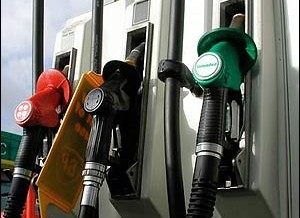
There I am, at a gas station in the wilds of Michigan and still some miles North of Detroit, filling my giant, rented SUV and the fuel pump … stops. Something is wrong. The car was almost empty – I have driven for a good 30 miles, slowly, fuel indicator unmoving on red, looking for somewhere to fill up. But the dial on the pump says I have put less that $100 in to the tank so either the car’s fuel guage is faulty or the tank is only about half full.
I explain the predicament to my co-driver Tom. Tom is a local – a marketing guru from Detroit and we are on the way to meet his wife and daughter for supper. “I know” says Tom angrily “It’s criminal. Fuel prices are SO high now”.
This was not the response I expected.
Finally it dawns on me. Whilst my UK Range Rover gulps down just under £130 for a fill-up (around $200) this SUV is replete with just $98.12 of fuel. This is simply because the fuel prices remain unbelievably low in the US (whatever the locals think). £60 to fill a four-by-four? Extraordinary! We all know that fuel prices were low in the US in the past. But I had driven past many US gas stations, glanced at the advertised price and simply not noticed the degree to which the price difference persists to this day. It is not an easy calculation to do in your head of course if you want to make the comparison because one has to convert $dollars per gallon to £pounds per litre.
Assuming an exchange rate of $1.55 : £1 and a conversion of 1 US gallon : 3.785 litres (yes a US gallon is smaller than an old Imperial gallon) it works out that my Detroit petrol was less than half the price of petrol in the UK.
I complained that my Range Rover only achieved 20 miles per gallon. “Is that bad?” queries Tom before confessing that he had no idea what his car achieved (we worked it out later – just over 12 miles per gallon for motorway/freeway driving). “We don’t really worry about fuel economy” said Tom.
“Bury your head in the (tar) sands and carry on regardless”
There are a couple of interesting points here:
Firstly, there is still a big fuel price differential between Europe and the US. World price variation is actually quite marked (see http://www.mytravelcost.com/petrol-prices/ for a great schematic) and even within country the prices in the US vary widely driven by variation in State fuel taxes.
Secondly, there is evidence that higher prices really do affect our attitude to consumption – or, more importantly, our attitude to efficiency. This is perhaps the real point. With fuel prices at a comparatively low level, Americans have little interest in fuel economy. Double the fuel price and, hey presto, even Americans would begin to take action.
Presumably doubling US fuel prices is a sure way for any Senator to avoid re-election however.
So what can be done to promote fuel efficiency if an economic motive is required? It is all about motive. I suppose one has to subsidise renewable fuel sources, funded by small increases in fuel duty. Or dedicate any uplift in fuel duty to American armament or some other perceived means of world domination. Or just bury your head in the (tar!) sands, and carry on regardless?
Actually such cheap jibes at the expense of our American friends raise a genuine question for the crowd:
How can democratically elected governments change consumer behaviour in favour of ‘green’ principles?
To be honest, I simply don’t know. Motivation is one of my favourite topics but the practical realities are difficult. So do you have thoughts on this? I sincerely hope that someone has an answer or two. Please scroll down and use the Comments box below to contribute your own thoughts, comments and suggestions. I will collate all suggestions made on Twitter … Watch this space.



